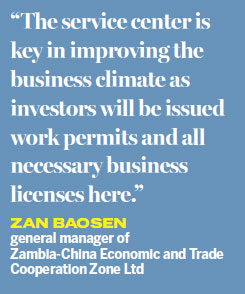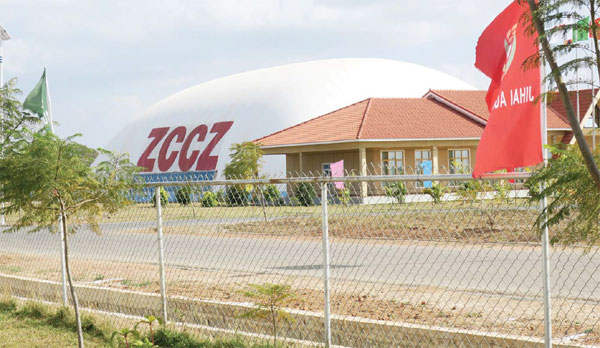Build a nest to attract the phoenix
Updated: 2016-09-16 07:09
By Lucie Morangi(China Daily Europe)
|
|||||||||
Stability, services and favorable policies encourage foreign investment, says manager of Zambia-China economic zone
Industrial parks in Africa are facing myriad challenges. Key among them are the serious infrastructure deficit and industrial zone policies that inadequately respond to market dynamism and political shocks, experts say.
These handicaps are holding back the potential of industrial parks in Africa according to the general manager of the Zambia-China Economic and Trade Cooperation Zone Ltd.
|
Lusaka East special economic zone in Zambia will provide 13,300 jobs. Lucie Morangi / China Daily |
Zan Baosen manages the nine-year-old firm established under the framework of the Forum for China-Africa Cooperation. It is China's first multifacility economic zone in Africa. ZCCZ manages the 11.58 square kilometer Chambishi industrial park and 5.7 sq km Lusaka East park that is adjacent to the airport in Zambia's capital. The zones were inaugurated in February 2007 and January 2009, respectively. Chambishi Zone has 6,658 employees while Lusaka East is expected to create 13,300 jobs.
ZCCZ Development Ltd, is registered under the Non-Ferrous Metals Corporation Africa. The NFCA is the Zambian subsidiary of China Non-Ferrous Metal Mining Group Co and has been exploring Chambishi copper mine in Zambia's Copperbelt region since 1998. The firm has successfully attracted at least 40 foreign firms in Chambishi park and 10 in Lusaka East. ZCCZ has spent about $1.5 billion in infrastructure development in both parks.
Since the enactment of the Zambia Development Agency Act No. 11 of 2006, the legal and regulatory framework overseen by the government agency, ZCCZ has been heavily engaged in developing infrastructure and basic utilities in the zones.
Unfortunately, years of inadequate investment in the transport and energy sectors has seen the landlocked country face a huge deficit. According to a 2010 report on Zambia's infrastructure by the World Bank, the country's infrastructure funding gap stood at $500 million a year (6.5 percent of GDP) with power leading as the biggest constraint responsible for about 50 percent of the productivity handicap faced by Zambian firms.
In Lusaka East zone, demand for power far outstrips supply. "We cannot meet the industrial demand, thus limiting the number of investors we can accommodate here. We are, however, happy to see the government looking into ways of boosting power supplies within two years," says Zan.
Zambia's total power capacity is 2,347 megawatts, with demand growing at an average of about 3 percent, or between 150 and 200 mW annually. There has been no major addition to the country's generation capacity in the past 20 to 30 years.
Investors look for land with adequate services to avoid unnecessary spending, says Zan. "They want to minimize their initial costs, thus avoiding hurdles such as buying land, which is difficult and expensive in Africa. Well-planned zones loosen the purse strings of foreigners interested in relocating to Africa," he adds.
While accentuating the need for better industrial policies and regulations, Zan says it was only recently that the government announced the establishment of a one-stop shop for investor services.

By borrowing approved and improved blueprints of Chinese economic zones, he had already prepared a service center to host government officials. It will be the first point of contact for investors. "The service center is key in improving the business climate as investors will be issued work permits and all necessary business licenses here. This is good news because it has worked in Chinese zones," Zan says.
His chagrin, however, is raised by levies imposed by local authorities without considering the return on investment for such project models. According to the government officials, the property where the industrial parks sits needs to be assessed for taxes. "Although the costs cannot be compared to financing the cost of a new road, it is a cost burden on us," says Zan.
The project harbors long-term benefits and the rent-seeking behavior is disheartening, he says. Zan says he cannot pass the costs to the tenants since it will immediately inflate their operational costs, making their products uncompetitive. "A responsive policy, therefore, should be able to overlook the need for short-term gains such as raising taxes from property that's undergoing development and patiently look at the gains to be found once it is complete and more, affluent tenants reside here."
In addition, strong institutions and policies will cushion the program from shocks occasioned by frequent government transitions. This year saw Zambia, one of the most politically stable African countries, hold its presidential elections. "Zone development and success outlives governments. Political processes should not interfere with this development," he says.
To strengthen local ownership, the Chinese firm has invited professionals such as lawyers to view the progress made so far and their enthusiasm and positive comments, indicative that he is on the right path, has buoyed the manager's confidence.
Despite the challenges, Zan thinks strong government support will boost the success of the zones. "This is the best way to diversify the economy from copper market dependency and attract investors not only in mining but also in agriculture. Zambia can thrive in agro processing since we consume drinks and food from other countries. We have enough maize, and fruits and we can add value to them," he says.
China is the third biggest investor in Zambia and by 2013 had set up more than 280 business enterprises, mainly in mining, manufacturing, agriculture, infrastructure development and resource extraction, according to government data.
lucymorangi@chinadaily.com.cn
(China Daily European Weekly 09/16/2016 page8)
Today's Top News
UK gives Hinkley Point nuclear power green light
Hillary Clinton remains healthy: doctor
UK confirms Hinkley project with 'new agreement'
Despite big deals, data shows less M&As after Brexit
New plan for grammar schools welcomed by Chinese
Moscow denies involvement in hacker attacks on WADA
EU should stay strong, stable and united: Tusk
Cameron to quit as MP; by-election triggered
Hot Topics
Lunar probe , China growth forecasts, Emission rules get tougher, China seen through 'colored lens', International board,
Editor's Picks

|

|

|

|

|

|








